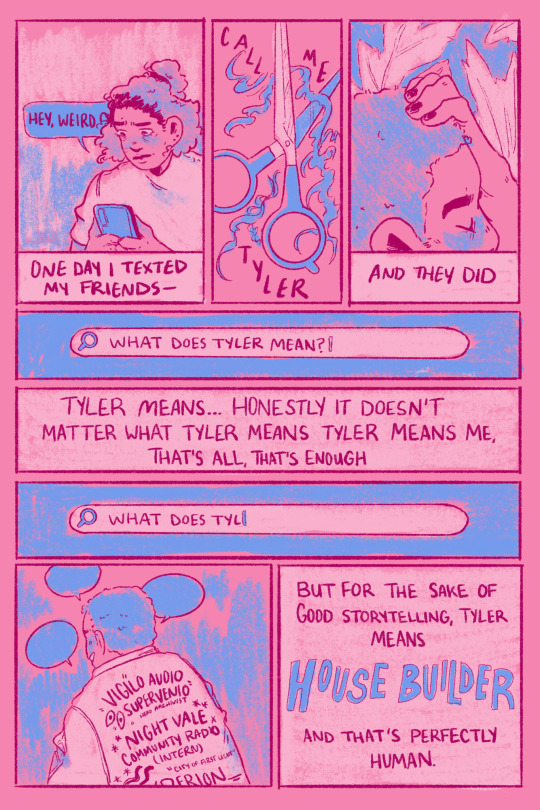Text


misstwisted
[Image ID: two gifs of a person's face. They're cosplaying an eldritch angel. The person's eyes are covered by crisscrossed golden bands covered in eyes that are looking back and forth. Their white hair is framed with six white and gold wings with an unmoving eye on each. End ID.]
156 notes
·
View notes
Text
So I've spent a lot of time untangling Christian exegesis of parables and talking about how the way Christians interpret parables almost always ends up being antisemitic.
But aside from how it makes them think about Jews and Judaism and Jewishness, I also want to talk a bit about how it makes them sympathize more with abusers than with victims.
The easy-to-point-to culprit here is the trilogy of parables that culminates in what most Christians know as the Prodigal Son story.
The common interpretation of these parables is that God does (and therefore Christians should) value a repentant sinner over someone who's never sinned.
The problem here isn't the stories themselves--they're pretty enigmatic as far as their actual meanings--but Luke's gloss:
"Just so, I tell you, there will be more joy in heaven over one sinner who repents than over ninety-nine righteous persons who need no repentance."
(Mark says, "So it is not the will of your Father in heaven that one of these little ones should be lost," which is very different.
So on its face, in 2023, that's a blatantly dangerous, abuser-supporting belief. What is it like to be a child sexually abused by your youth pastor and to hear that the fact that he hurt you is part of what makes him somehow spiritually "better" than you?
And we can see it play out in the way Kevin M. Young, a popular progressive pastor on Twitter (who describes himself as "post-evangelical" and was the senior pastor at a Quaker congregation) responded to being told one of his tweets was antisemitic, and then jumped in to support a woman who responded by identifying herself as a fan of John Chrysostom (the literal author of "Against the Jews" and the most antisemitic of the Church Fathers, which is saying something).

I'm not going to transcribe the whole thing, because it's not all that important for what I have to say about this, but I am going to call out a few lines:
"The American Christian approach to t'shuvah sees the victim's spirit, character, and speech as equally important to the offenders. I.e. in Christendom, the victim can exceed the sin of the offender simply by their reaction (if it be in sin or acted in a way that is not Spirit led)."
So, to be clear, if someone assaults you, and you don't meekly forgive them in a "Spirit led" way, you're somehow worse than they are.
The uniquely Christian brain rot here is in seeing every sin as an opportunity for forgiveness. After all, if being a repentant sinner gives you a higher spiritual status--if there's more "rejoicing in Heaven" over you--than that of your victim, then you have to sin to get there. It treats other people as props in your salvation journey, not as fellow humans whose suffering matters. (Combine that with the Christian idea that suffering is somehow virtuous in and of itself, and you've got a very toxic recipe. Not only, by abusing others, are you guaranteeing your own value as a repentant sinner, but you're giving your victim the opportunity to ennoble themselves through suffering.)
Of course, a key word here is repentant. Put a pin in that.
These sort of exchanges on Twitter--a Christian being outright genocidal toward Jews, and a supposedly progressive Christian figure jumping in to defend the Christian, with seemingly no ability to comprehend that the Jews in the conversation are human beings who may have their own trauma around violently antisemitic language, with boundless empathy for the Christian abuser and none for the Jewish targets of their abuse--happen frequently and just as frequently leave Jwitter baffled in addition to angry.
Why all this empathy for the abuser and none for the victims?
I think a lot of this comes out of progressive Christian exegesis of parables, which is frequently looking for the radical "twist" to the story.
E.g. in the story of the Pharisee and the Tax Collector, the assumption is that the audience of the time would have empathized with the Pharisee, and thus the twist is to make them empathize with the tax collector. In the story of the Good Samaritan, the assumption is that they would have seen the Samaritan as a threat, and the twist is to make him the hero.
The thinking goes that the audience would have had empathy for certain groups and none for others, so the stories push them to feel that empathy for the latter, and that this was needed to balance the scales, to make sure everyone was receiving love and empathy and care.
Except that this, in modernity, has the effect of simply reversing the roles, not balancing them. The groups that are assumed to be in good social standing get no empathy, even become the implicit villains, and the groups (supposedly, since this is now a Christian-dominant society) traditionally looked down on get all of it.
That might still be a balancing act if the "looked down on" groups were actually marginalized. But in the Christian imagination, that role is filled by sinners in need of Christian grace, not necessarily demographically marginalized groups.
The idea seems to be that the victims are getting sympathy from elsewhere, so it's the Christian's job to make sure the abuser/sinner gets sympathy too.
But I'll point again to that pesky word "repentant."
Ultimately, when it comes to treatment of Jews and Muslims and anyone else who points out that a Christian has in some way harmed them, Christian sympathy goes immediately to the offender before the offender has even expressed any repentance.
The repentant sinner is so much more valuable, at this point, than their victims that they must be preemptively forgiven, that they are more valuable purely because they now have the potential to repent.
And this seems to be lurking under not just how "progressive" pastors act on Twitter, but in a lot of our cultural narratives around, say, college rapists and their futures, around white people who are publicly called out for racist acts, etc.
730 notes
·
View notes
Text
I am just a Little Angel who has a very complex and probably unhealthy relationship with their god.
72 notes
·
View notes
Text
genuinely hope to see the fall of christianity as a global power some day in my lifetime
belief on an individual level, whatever that's fine, but do not act as if christianity's influence and doctrine is not a heavy hand behind some of the most evil governmental decisions being wrought upon people at this very moment (anti-trans bills, don't say gay bills, roe vs. wade repeal, etc)
people who are not christian are being forced to live by christian standards and under christian rules and that isn't right
63K notes
·
View notes
Text
You want me to love you? Then give me everything you have and everything you are, nothing less.
15 notes
·
View notes
Text
You’re worthless without me. Only by standing by my side will you ever be more than the bug you are. Do as I say and I might even consider you a boon.
9 notes
·
View notes
Text
i know that it's seen as, like, a fedora reddit atheist thing to say 'the christian practice of teaching children about hell is child abuse' but the christian practice of teaching children about hell is child abuse and the more time i spend with people who were raised very christian the more confident i am about saying this.
17K notes
·
View notes
Text
When I was a kid I always wanted something bad to happen to me so I could feel justified in my constant state of anxiety and depression. I had no explanation for those feelings.
And now I only have theories. Is it the indoctrination? The hereditary mental illness? The generational trauma from a cult? Or was I just born this way?
54 notes
·
View notes
Text

“Now I lay me down to sleep,
You slip out my mind
And roll down my cheek;
And if I die before I wake,
I pray the Lord
Your soul I’ll take.”
187 notes
·
View notes








